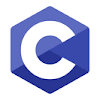The “C” language is one of a huge number of programming languages currently in use, and one of the oldest. It was created in the early seventies of the twentieth century by Dennis Ritchie while he was working in Bell Laboratories. Some say that “C” was a by-product of a project which led to the very first version of the Unix operating system. There are many other programming languages widely used – some of them could be regarded as “C” descendants. They even inherited a name from their ancestor – like “C++” or “C#”. Others borrowed some features from the original “C” and added lots of new ones – like Perl, Java or JavaScript.
What is the most common use of “C”? It is the so-called general-purpose programming language, i.e., suitable for almost any programming project and at the same time not particularly predestined to any specific, narrow class of applications. It’s best if used for coding drivers, embedded applications or operating systems (for example, the Linux kernel is mainly coded in “C”). You can also use it for building complex utilities. We can assure you that knowing the “C” language is very helpful if you want to learn C++, C# or Java.
We guarantee you that the time you spend learning the “C” language won't be wasted.
"The C Programming Language" book
If you take the learning of the “C” language seriously, you certainly won’t stop at reading this text. Among the hundreds of books written about the “C” language, there is one which is particularly recommendable. The book has been issued dozens of times all around the world and is available in over 20 different (natural) languages. We recommend it without hesitation. Without any doubt, it is the best book on C programming ever written – its high quality can be proven by the fact that one of its authors is Dennis Ritchie.
The second author is Brian Kernighan, Dennis' co-worker from when they worked together at Bell Labs. The book is called simply The C Programming Language, but don’t be surprised when your friends address it as just “Kernighan-Ritchie”.Once you're a proficient programmer, you’ll want access to a source of knowledge through which you can quickly understand the answers to emerging questions or just fill in the gaps in your memory. Instead of a handbook, you’ll need a book which briefly describes the language standards – everything that’s really important and nothing more. This book is actually a report (permanently improved and updated), published by the ISO standardization committee. The most recent version of the report is ISO/IEC 9899: TC3. You can find it on the Internet and look it up, but it’s still too soon for you to be reading it.




0 Comments
Tell us your queries or more topics which you want